How to Build Custom Dashboards Using Web Scraping Hotel Data For Analytics?
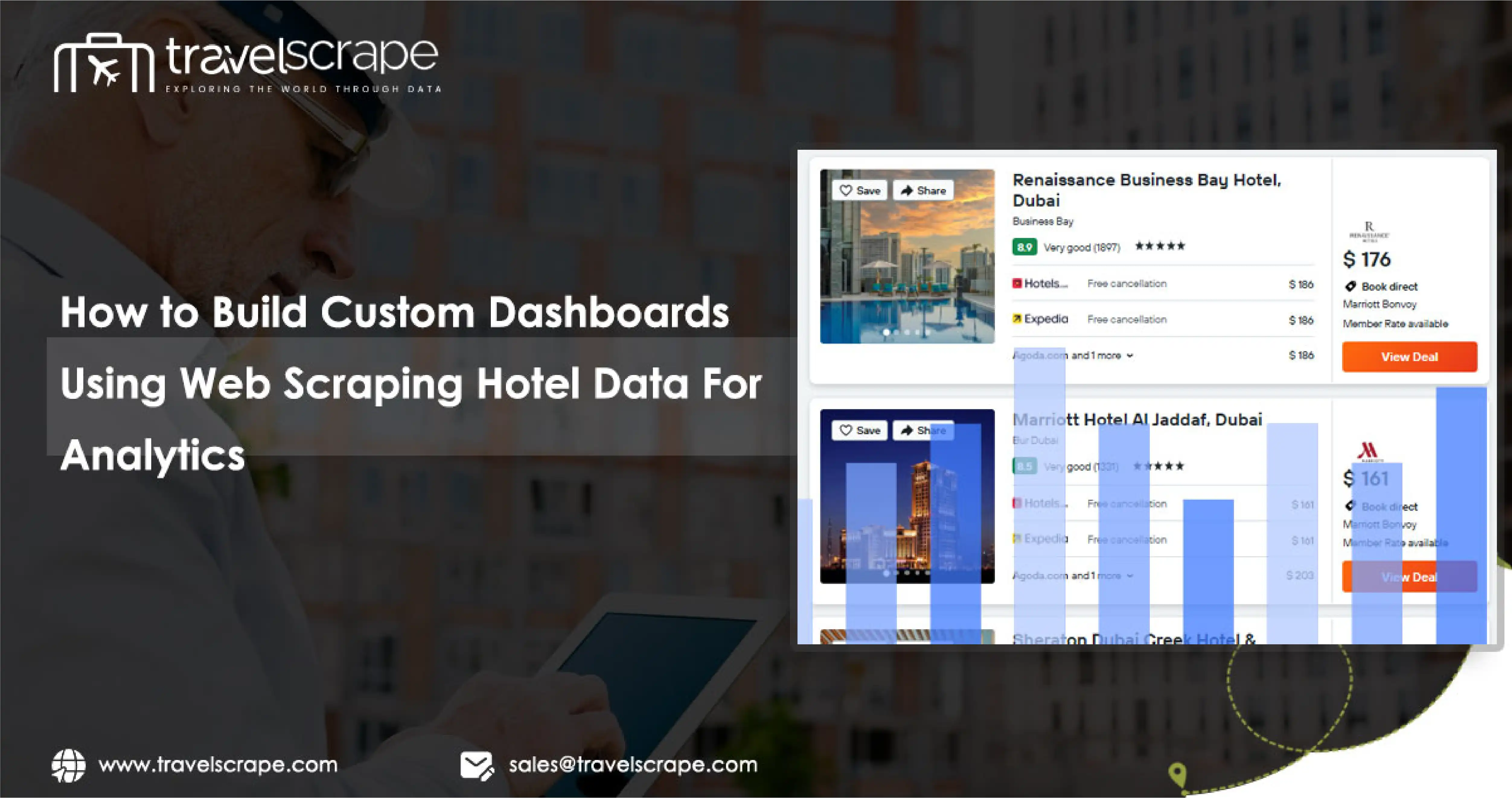
Introduction
In the highly competitive hospitality industry, data-driven decision-making is crucial for hotels aiming to maximize revenue, refine pricing strategies, and enhance market positioning. Leveraging Web Scraping Hotel Data For Analytics offers a cost-effective way to gather comprehensive market intelligence without depending solely on costly third-party solutions. By developing custom dashboards powered by web-scraped data, hotel managers and revenue teams can access real-time insights that drive profitability and strategic growth.
This blog provides a step-by-step approach to creating tailored analytics dashboards using hotel data extraction techniques. From establishing the required infrastructure to visualizing competitive intelligence, you'll learn how Hotel Analytics Dashboard With Data Scraping can transform raw data into actionable business insights. Whether you're a seasoned developer or a hotel manager looking to enhance data capabilities, this guide equips you with the technical know-how and strategic insights needed to implement effective hotel business intelligence solutions.
Understanding the Value of Hotel Data Analytics
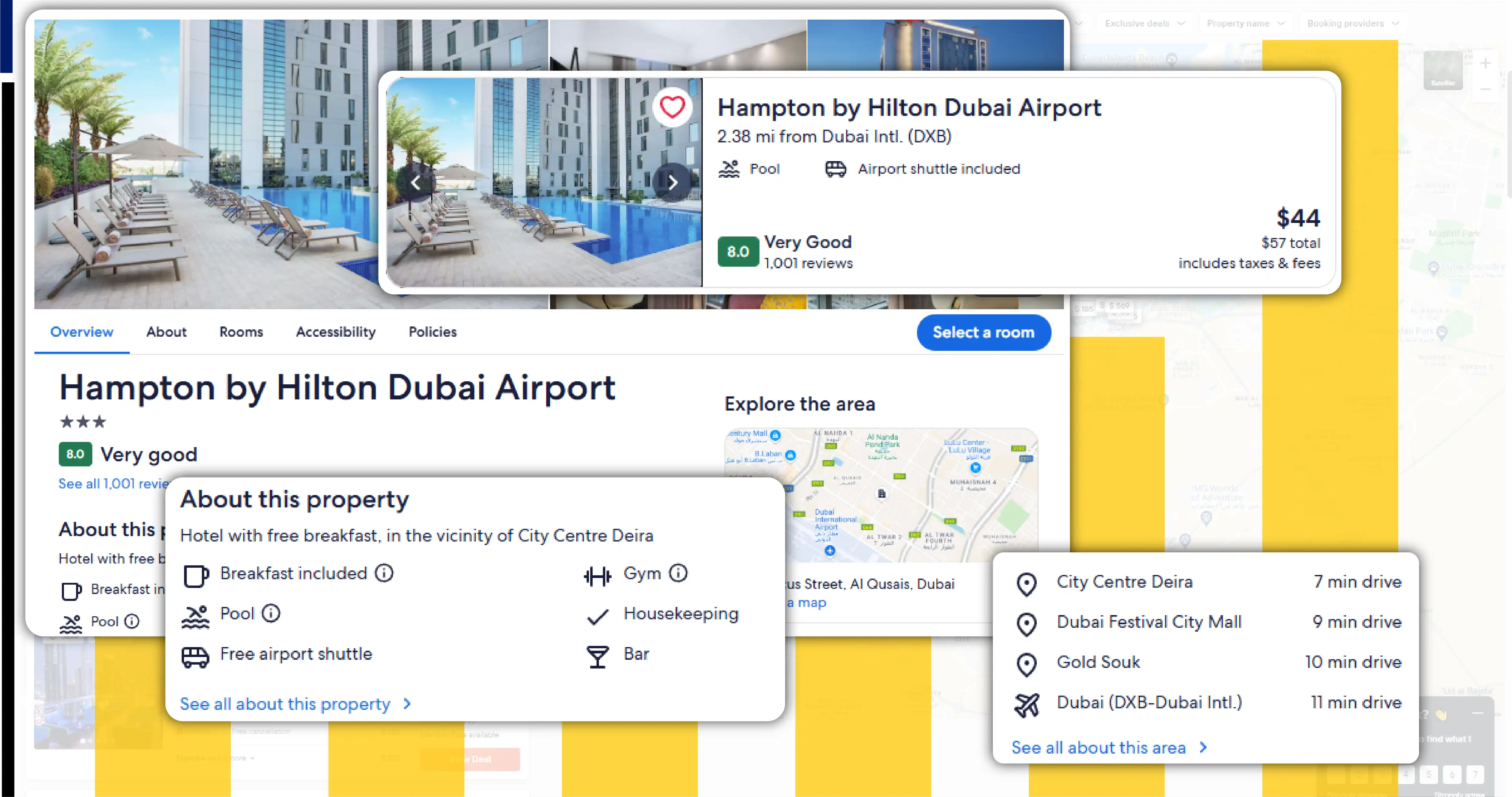
Before exploring the technical aspects of web scraping and dashboard creation, it’s essential to understand why Web Scraping For Hotel Business Intelligence has gained significant importance in recent years.
The hospitality sector produces an enormous volume of data daily, from pricing fluctuations and availability to customer reviews and competitor promotions. When properly collected and analyzed, this data provides valuable insights, including:
- Competitive Positioning: Understanding how your property compares to competitors enables strategic adjustments in pricing and service offerings.
- Demand Forecasting: Recognizing patterns in booking behaviors and market trends allows for more accurate predictions of future demand.
- Pricing Optimization: Access to real-time market data helps set optimal rates, maximizing occupancy and revenue per available room (RevPAR).
- Market Segmentation: Data-driven insights reveal the most valuable customer segments and the best strategies to target them effectively.
A Custom Hotel Data Dashboard converts this raw information into visually intuitive formats, making complex data patterns immediately recognizable. This empowers businesses to make faster, data-driven decisions with greater confidence.
The Legal and Ethical Framework for Web Scraping
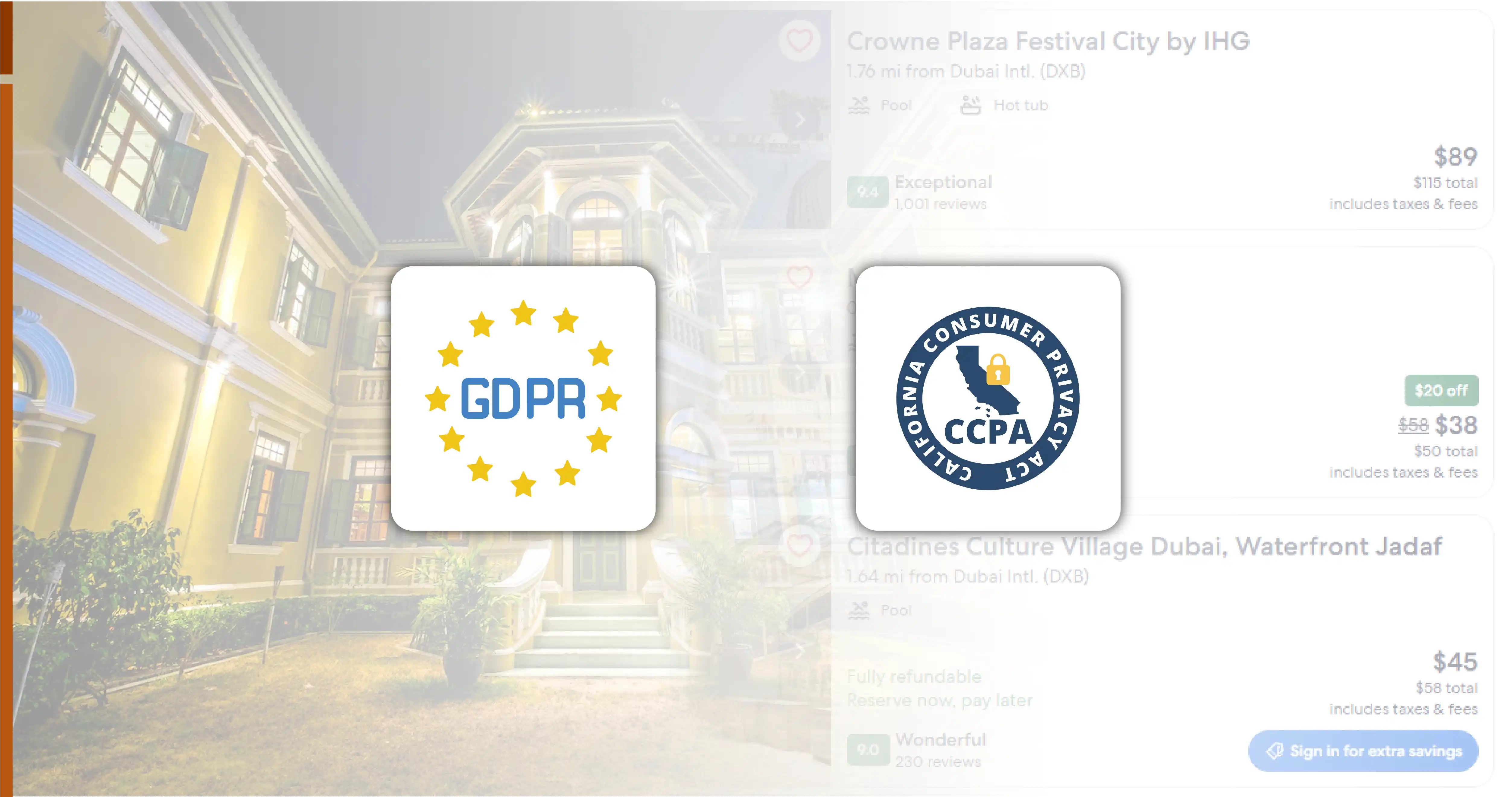
Before deploying any data extraction solution, it is essential to navigate the legal and ethical landscape of web scraping to ensure compliance and responsible data collection:
- Terms of Service: Always review the terms of service of the websites you intend to scrape, as many explicitly restrict automated data collection.
- Rate Limiting: Introduce reasonable delays between requests to prevent overwhelming target servers.
- Data Privacy: Adhere to relevant privacy laws such as GDPR or CCPA, especially when handling personally identifiable information.
- Public Data Focus: Prioritize scraping publicly available information rather than attempting to access password-protected content.
- Proper Identification: Use user-agent strings to identify your scraper transparently.
Reputable Hotel Data Scraping Services operate within these ethical boundaries, ensuring they collect publicly available information while respecting website infrastructure and regulations.
Technical Components for Building Hotel Data Analytics Systems
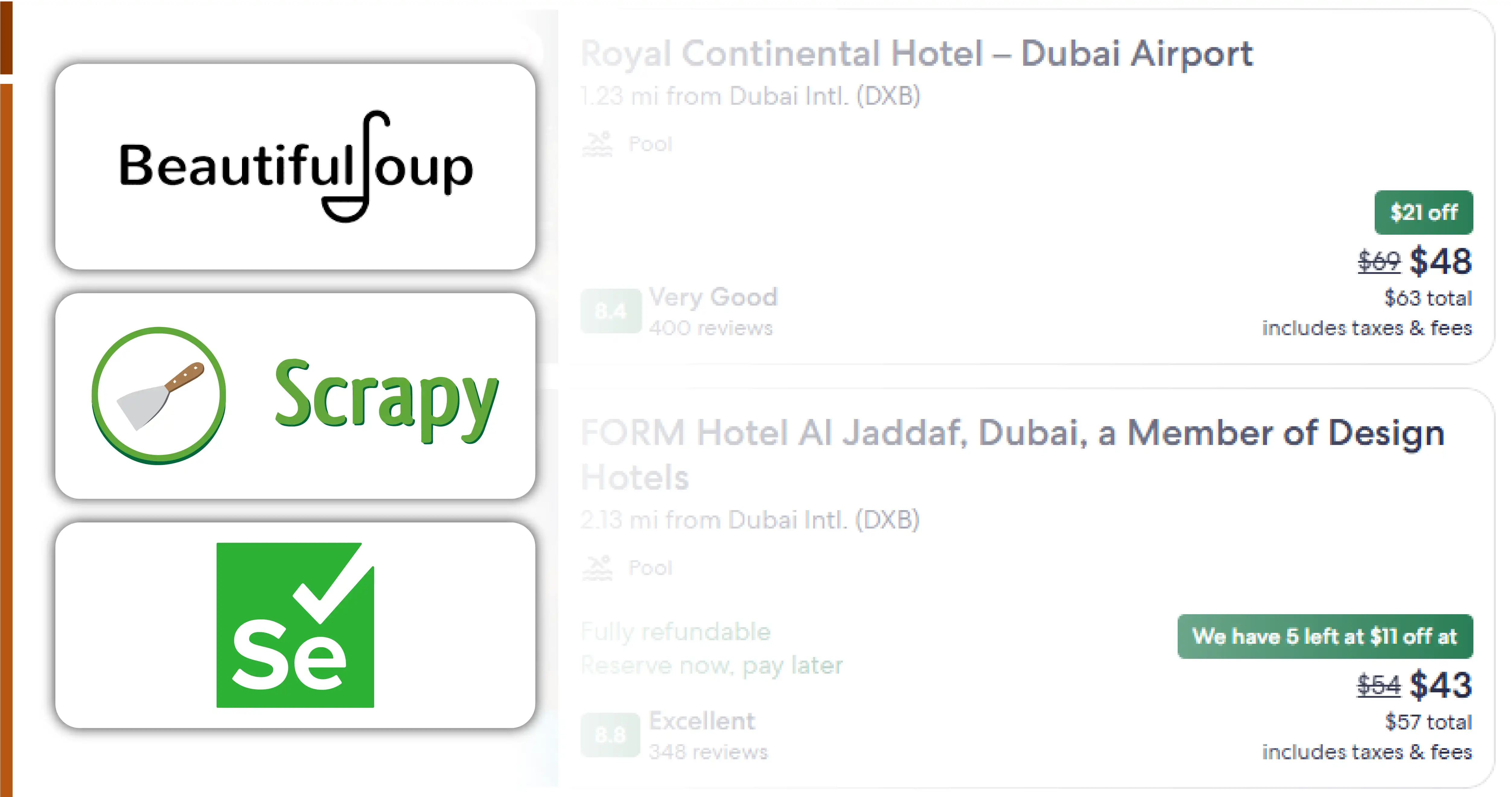
Developing a powerful Hotel Data Analytics Dashboard requires several key components that work together seamlessly.
● Data Collection Infrastructure
The backbone of any hotel analytics system is a well-structured data collection infrastructure. This typically involves using programming languages like Python (with libraries such as Beautiful Soup, Scrapy, or Selenium) or Node.js (with Puppeteer or Cheerio) to extract data efficiently. Additionally, specialized Travel Scraping API services help streamline the process.
Key challenges include handling JavaScript-rendered content, managing CAPTCHA and anti-bot mechanisms, ensuring stability during network fluctuations, and implementing proxy rotation to maintain uninterrupted access.
● Data Storage Solutions
Once collected, data must be stored efficiently in an appropriate system. Options include relational databases like PostgreSQL and MySQL for structured data, NoSQL solutions like MongoDB for flexible schemas, data lakes for large-scale raw data storage, and time-series databases for tracking temporal trends. The choice of storage depends on data volume, query patterns, and analytical requirements.
● Data Processing Pipeline
Raw scraped data is rarely ready for analysis, making a data processing pipeline essential. This involves cleaning and normalizing data to handle missing values and standardized formats, enriching datasets with additional sources, feature engineering to derive key insights, and aggregation for easy visualization. Tools like Apache Airflow and Python-based ETL frameworks can automate these workflows efficiently.
● Visualization and Dashboard Technologies
Visualization and dashboard technologies play a crucial role in converting processed data into actionable insights. Popular solutions include Tableau, Power BI, and Python-based frameworks like Dash and Streamlit. Additionally, JavaScript libraries such as D3.js and Chart.js or custom web applications offer various levels of customization and accessibility, depending on the complexity of analytical needs.
Step-by-Step Guide to Building a Hotel Analytics Dashboard
Let’s walk through the practical process of creating a Hotel Analytics Dashboard With Data Scraping:
1. Define Key Performance Indicators (KPIs)
Start by determining the essential metrics that have the most significant impact on your hotel business:
| KPI Category | Example Metrics | Data Source Type |
|---|---|---|
| Pricing | Average daily rate (ADR), Rate parity across channels, Competitor pricing | OTA websites, Hotel direct sites |
| Availability | Inventory levels, Booking patterns, Length-of-stay restrictions | Booking engines, OTA websites |
| Reputation | Review scores, Sentiment analysis, Service mentions | Review platforms, Social media |
| Market Position | Comparative pricing index, Share of visibility, Ranking position | OTA search results, Metasearch engines |
Clearly defined KPIs ensure your data collection efforts remain focused and your dashboard delivers actionable insights.
2. Implementing the Data Processing Pipeline
After data collection, the next crucial step is processing the raw data to ensure accuracy and meaningful insights. Below is a structured approach to handling this phase:
● Data Cleaning
To ensure high-quality and reliable hotel data, duplicate entries must be removed, missing values must be handled effectively, and hotel names and attributes must be standardized. These steps help maintain consistency and accuracy in the dataset.
● Data Enrichment
Enhancing the dataset involves adding geographical coordinates for mapping purposes, incorporating hotel categories and star ratings, and merging the data with historical records. This process improves the depth and usability of the information for analysis.
● Feature Engineering
Various features can be engineered to extract meaningful insights, such as calculating price indices relative to market averages, deriving day-of-week and seasonality trends, and computing running averages to identify pricing and demand patterns over time.
● Aggregation
Data can be summarized by location, hotel category, or period to facilitate analysis at different levels. Additionally, creating comparison sets allows for practical competitive analysis, helping businesses assess market positioning and trends.
3. Designing and Developing the Dashboard Interface
Once the data is processed, the next step is to create a user-friendly dashboard that transforms raw insights into actionable intelligence. A well-structured Custom Hotel Data Dashboard typically includes:
● Executive Summary Panels
Gain a comprehensive understanding of the market landscape with key insights into market pricing overview, competitive position indicators, and key trend visualizations. These panels provide a high-level snapshot of crucial data points, enabling quick and informed decision-making.
● Detailed Analysis Sections
Delve deeper into pricing intelligence with price comparison charts, availability pattern graphs, and review sentiment analysis. These analytical tools help uncover trends, monitor fluctuations, and assess consumer sentiment, offering valuable perspectives on market dynamics.
● Interactive Features
Enhance data exploration with advanced interactive tools such as date range selectors, competitive set filters, and drill-down capabilities. These features allow users to refine their analysis, customize data views, and extract precise insights tailored to their needs.
● Alert Components
Stay ahead of market shifts with real-time alerts, including a notification system for significant price changes, competitive movement alerts, and demand pattern anomalies. These proactive alerts ensure businesses can respond swiftly to emerging trends and maintain a competitive edge.
Advanced Features for Hotel Analytics Dashboards
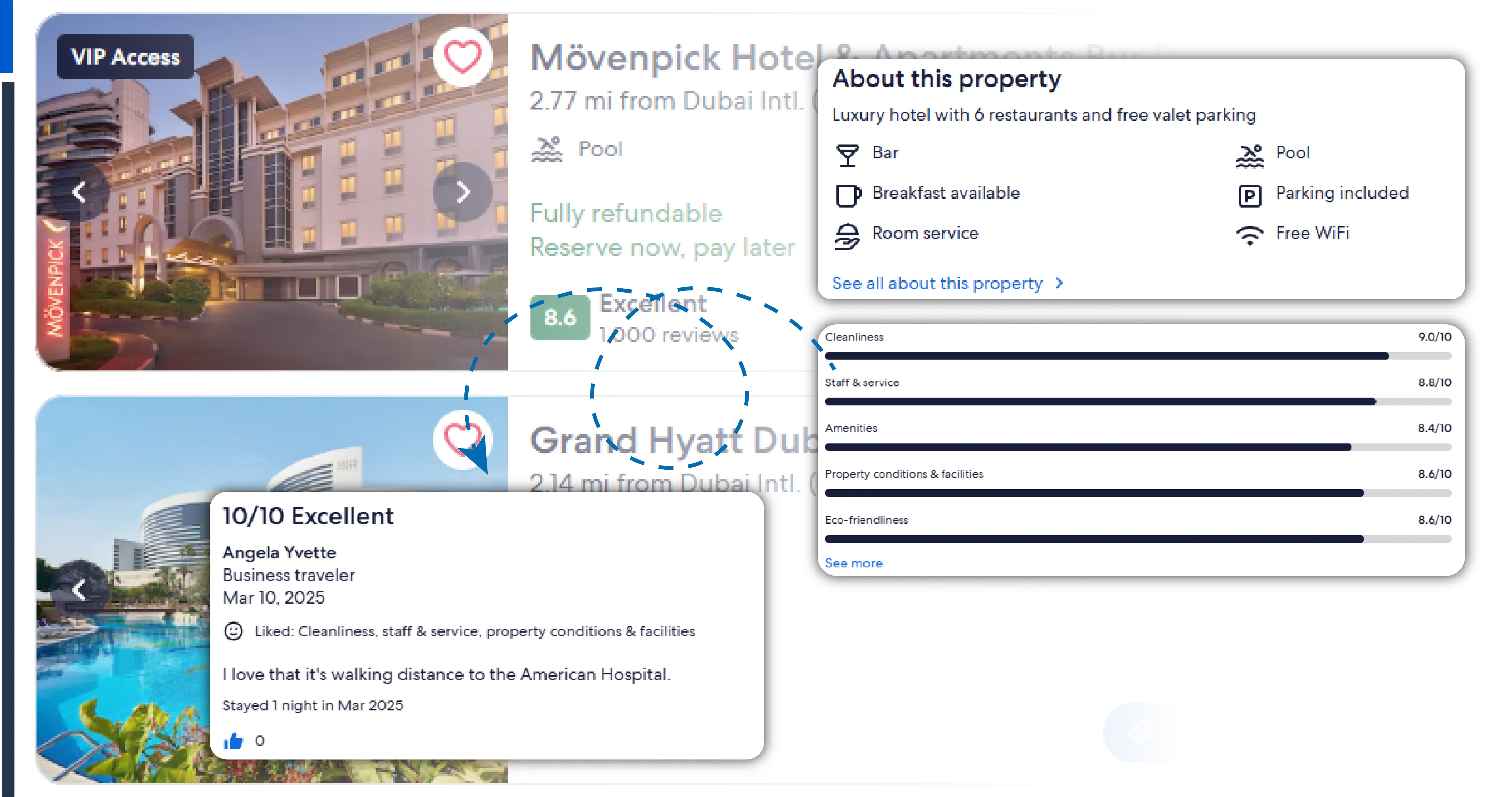
To maximize the value of Web Scraping For Hotel Business Intelligence, integrating advanced analytics features into your dashboard can enhance decision-making and market responsiveness.
1. Real-Time Monitoring and Alerts
Elevate your dashboard from a static reporting tool to a proactive decision-making system with real-time alerts, enabling immediate action:
- Price change alerts: Get notified instantly when competitor rates shift significantly.
- Demand surge indicators: Detecting unusual booking spikes, helping you optimize pricing strategies.
- Review monitoring: Stay informed of new reviews or major sentiment shifts that could impact your reputation.
2. Predictive Analytics Integration
Go beyond standard reporting by leveraging predictive analytics to anticipate market trends and optimize revenue strategies:
- Demand forecasting: Utilize machine learning to predict occupancy based on historical trends and real-time market indicators.
- Price optimization recommendations: Implement algorithm-driven rate adjustments for competitive positioning.
- Trend identification: Detect emerging market patterns early to refine pricing and marketing strategies.
3. Competitive Set Analysis
Gain deeper insights into market positioning through comprehensive competitive analysis:
- Detailed competitor profiles: Track key competitors' pricing strategies, availability, and positioning.
- Market segment analysis: Assess performance across different property types within your market.
- Promotional activity tracking: Monitor discounting patterns, special offers, and dynamic pricing strategies.
4. Review and Sentiment Analysis
Leverage Travel Review Data Intelligence to gain a clearer understanding of guest perceptions and brand reputation:
- Sentiment trend tracking: Analyze how guest sentiment evolves and identify shifts in customer expectations.
- Feature-specific analysis: Pinpoint hotel attributes that consistently receive praise or criticism to drive operational improvements.
- Competitive comparison: Benchmark your property’s reputation against competitors to enhance your positioning in the market.
By integrating these advanced features, hotel analytics dashboards become potent tools for data-driven decision-making, enabling real-time strategy adjustments and long-term market positioning.
Common Challenges and Solutions in Hotel Data Scraping
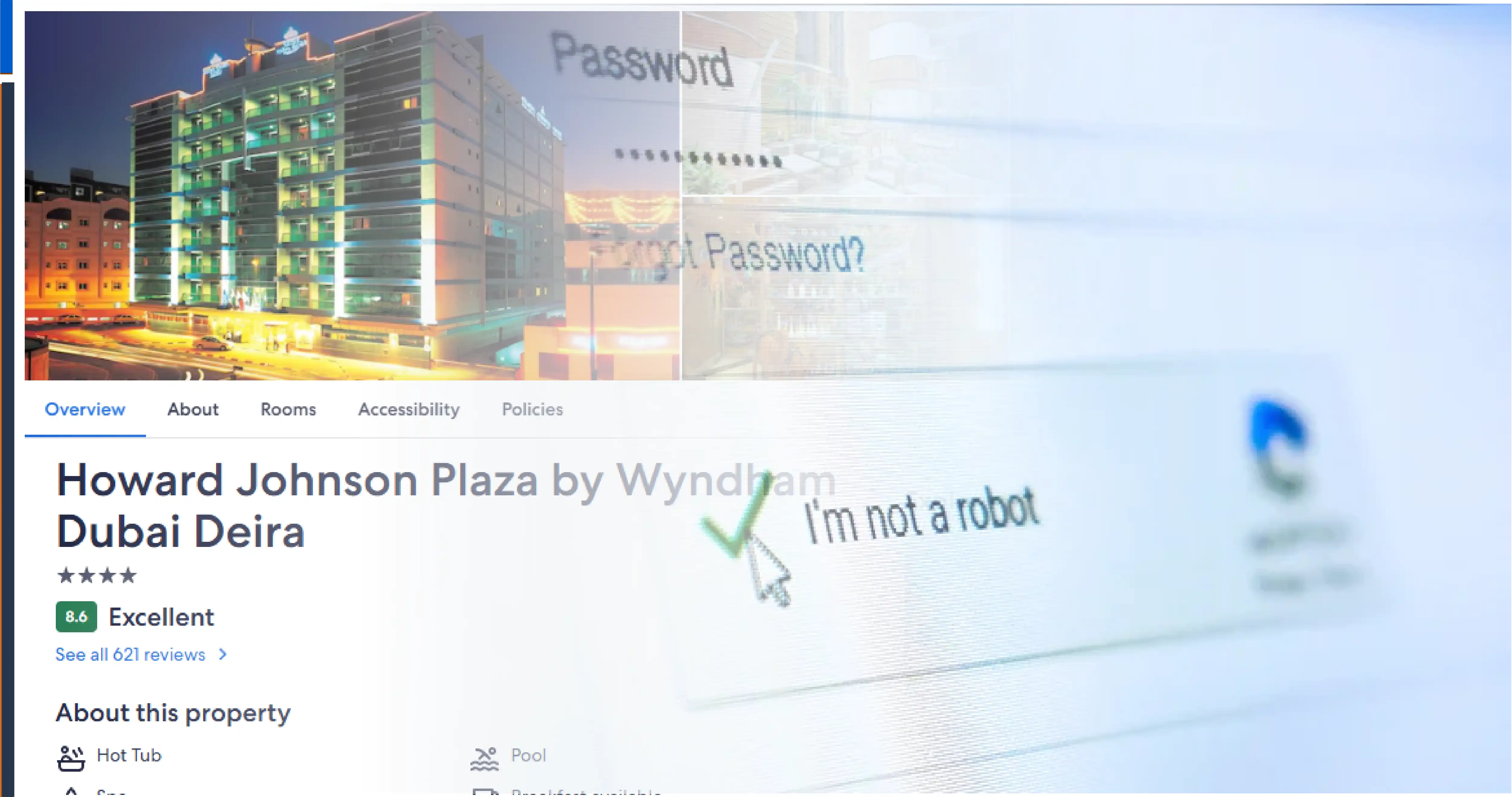
Building effective Web Scraping For Hotel Analytics systems comes with several challenges:
1. Anti-Scraping Measures
Many hotel and OTA websites use advanced techniques to block automated data collection.
- Challenge: CAPTCHA verification, IP blocking, and dynamic content rendering hinder continuous data extraction.
- Solution: Deploy rotating proxies, implement browser fingerprint randomization, and utilize headless browser automation with human-like interaction patterns to bypass detection.
2. Data Structure Changes
Frequent website updates can disrupt scraping scripts.
- Challenge: Sudden modifications to website layouts, class names, or underlying HTML structures can break existing scrapers.
- Solution: Use robust selector strategies with fallback mechanisms and automated monitoring systems to detect and adapt to changes in real-time.
3. Data Volume Management
Extracting large-scale hotel data demands efficient storage and processing solutions.
- Challenge: Managing and analyzing terabytes of historical pricing and availability data without compromising performance.
- Solution: Implement data retention policies, optimize storage through aggregation strategies, and utilize cloud-based scalable storage solutions for seamless data handling.
4. Accuracy and Validation
Maintaining high data integrity is critical for reliable analytics.
- Challenge: Ensuring that extracted data accurately reflects real-time information displayed on websites.
- Solution: Apply validation checks, conduct sample manual verification, and cross-check data with multiple sources for consistency and reliability.
By addressing these challenges with the right strategies, businesses can ensure seamless hotel data scraping operations while maintaining accuracy, efficiency, and scalability.
How Travel Scrape Can Help You?
We deliver comprehensive Hotel Data Intelligence solutions to meet your unique business needs. Our team blends technical expertise with in-depth industry insights to provide actionable intelligence through customized analytics dashboards that drive informed decision-making.
Our Custom Travel Data Solutions cover the entire data lifecycle:
- Data Collection: We leverage advanced scraping technologies to extract data efficiently while adhering to website policies and technical constraints.
- Processing and Analysis: Our data scientists refine raw data into meaningful metrics and KPIs aligned with your business objectives.
- Dashboard Implementation: We develop intuitive, interactive visualization interfaces to simplify complex data for straightforward interpretation.
- Ongoing Support: Our team ensures continuous monitoring, updates, and enhancements to align your analytics system with evolving business needs.
Whether you're a boutique property aiming to navigate your local market or a hotel chain seeking enterprise-scale competitive intelligence, We provide the technical infrastructure and analytical expertise to help you gain a decisive edge in the hospitality industry.
Conclusion
Implementing Web Scraping Hotel Data For Analytics offers hotels a powerful tool to enhance revenue and guest satisfaction. By creating a Hotel Data Analytics Dashboard, hotels can visualize market dynamics, competitive positioning, and demand trends, enabling data-driven decisions.
For Travel aggregators and businesses aiming to Scrape Mobile Travel App Data , monitoring hotel reviews is a crucial step toward delivering exceptional customer experiences.
Contact Travel Scrape today for cutting-edge web scraping solutions tailored to your needs. Let us empower your travel business with actionable insights!